
The Global Business Ethics Survey
Since 1994, the Ethics & Compliance Initiative (ECI) has conducted the most reliable longitudinal, cross-sectional study of workplace conduct from the employee’s perspective.
Referenced from boardrooms to classrooms, this rigorous study has been a benchmark for many ethics & compliance (E&C) professionals. Over the years, leading academics, survey researchers, experts on culture and business ethics have worked on ensuring validity regarding the survey questions, methodology and results.
Now in its 17th iteration, ECI’s Global Business Ethics Survey® (GBES®) data provide the global benchmark on the state of ethics & compliance in business across the globe.
Survey participants are asked to provide insight on a variety of topics, including the strength of the ethics culture in their workplace, the instances of misconduct that they have observed and what, if any, efforts are underway in their organization to promote integrity.
This version of the study is ECI’s largest undertaking in its history. The international benchmark is a sample built from surveying employees in 42 countries across all regions of the world.
Additionally, in the GBES, new topics are explored. In this version, ECI examined organizational environmental, social and governance (ESG) efforts from the vantage point of the employees and conducted more inquiry into the presence of unethical conduct. Findings from these areas will be shared in future releases from ECI.
For brevity and ease of use, charts with specific country information are limited to those with the highest and lowest scores for each of the key metrics discussed in this report.
Results for all 42 countries, including demographic information and aggregated responses to approximately 40 GBES questions are available in ECI’s new interactive, searchable, GBES Database. A GBES Dashboard is available to the public while more in-depth information is accessible to ECI members at the Fellow and Senior Fellow levels.
GBES Database GBES Dashboard Listen to GBES Podcasts
What’s the Big Picture?
Businesses face higher risk for misconduct and loss of trust than ever before.
Over the past 30 years of GBES research, ECI has identified and proven that certain “outcome” metrics are indicative of the well-being of workplaces, from an ethics & compliance perspective. The following are the critical measures of “the state of ethics & compliance in the workplace”:
- Pressure in the workplace to compromise ethical standards;
- Observations of misconduct by employees as they go about their day-to-day work;
- The reporting of misconduct when observed;
- Any retaliation perceived by employees after they report misconduct; and
- Strength of workplace culture from an ethics & compliance perspective.
In this, the largest and latest update to the GBES body of research, employees in 42 countries around the world told us that there is reason for concern. The following sections of this report provide more detail.

Key Finding 1
Employees continue to face exceptionally high levels of pressure to compromise workplace standards or the law.
In the last GBES State of Ethics & Compliance in the Workplace update, employee pressure to compromise standards reached an all-time high at 29%. Presently, the global median remains relatively unchanged at 28%.
This result stays concerning as pressure to compromise workplace ethics & compliance standards often serves as a warning sign for both existing and future misconduct. Eighty-four percent (84%) of employees who reported feeling pressure to compromise workplace standards also observed misconduct.
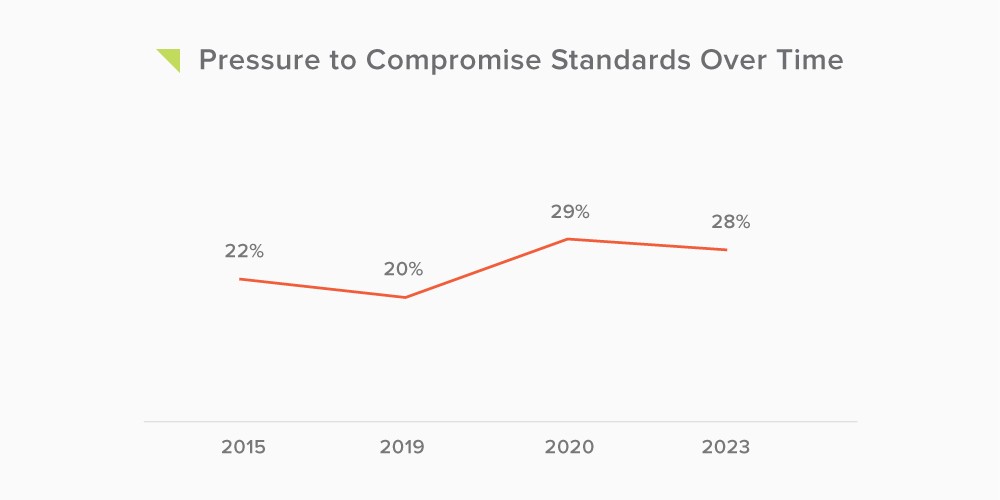
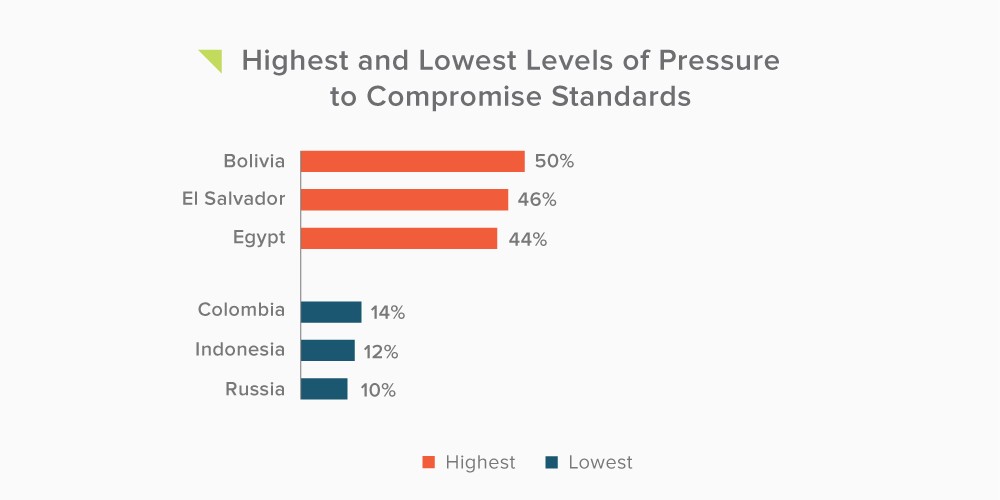
Key Finding 2
Workplace misconduct is at an all-time high.
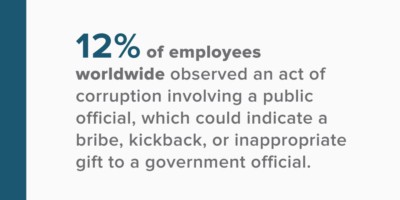 Almost two-thirds of employees (a global median of 65%)1 said that within the last 12 months they observed at least one act that they deemed to be a violation of their organization’s standards or the law. Previously, the highest level of misconduct measured through GBES was a global median of 60%. In the last two GBES updates, ECI’s calculation of misconduct was updated to utilize an index measuring specific types of wrongdoing. Therefore, a chart with global trends prior to 2020 is not available. However, ECI has been tracking misconduct levels via this index in the U.S. since 2000 and the same pattern of high and rising misconduct is observed. The rise in misconduct stands at a level of great concern.
Almost two-thirds of employees (a global median of 65%)1 said that within the last 12 months they observed at least one act that they deemed to be a violation of their organization’s standards or the law. Previously, the highest level of misconduct measured through GBES was a global median of 60%. In the last two GBES updates, ECI’s calculation of misconduct was updated to utilize an index measuring specific types of wrongdoing. Therefore, a chart with global trends prior to 2020 is not available. However, ECI has been tracking misconduct levels via this index in the U.S. since 2000 and the same pattern of high and rising misconduct is observed. The rise in misconduct stands at a level of great concern.
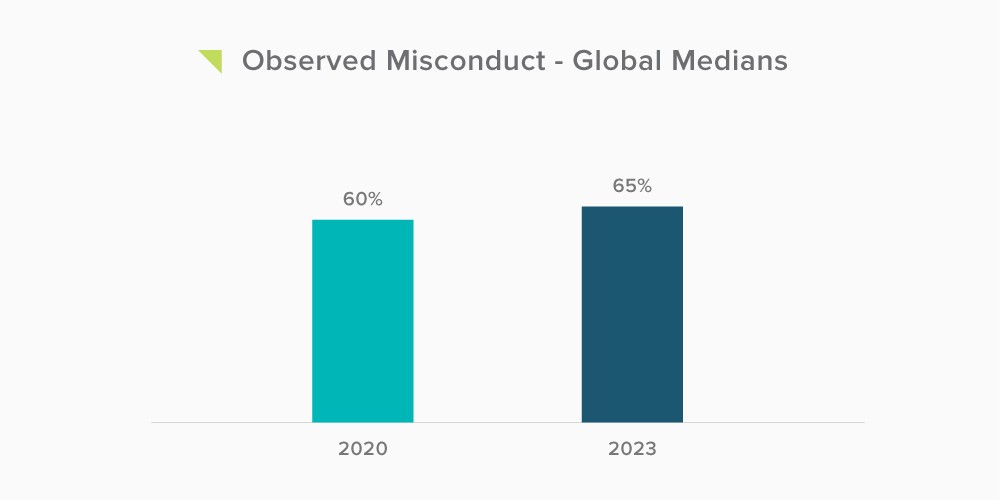
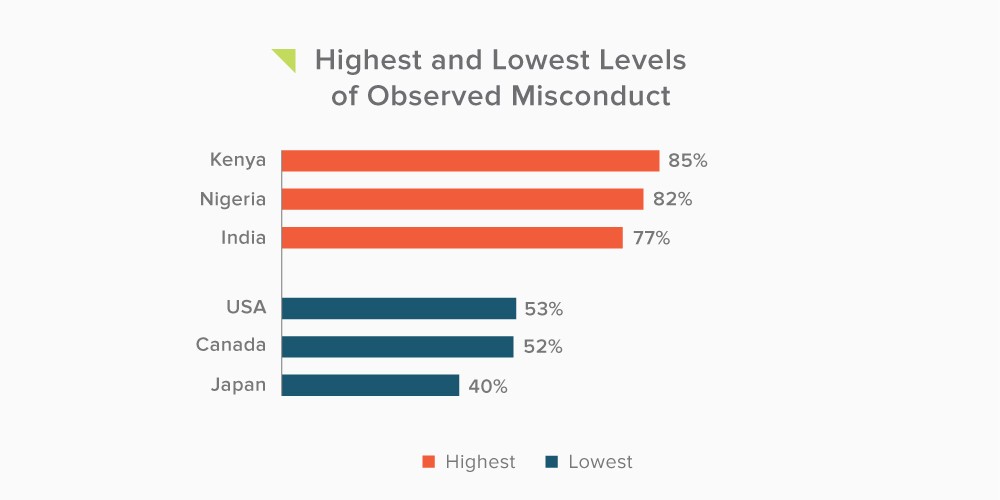
1The global median is based on 26 possible specific types of misconduct a respondent might have observed in the past 12 months. The 26 specific types of misconduct are grouped together for this analysis.
Key Finding 3
Globally, reporting of observed misconduct is at a record high.
The most promising result in this GBES update is that 72% of employees who observed misconduct reported their observation.2 This is an increase of four percentage points from 2020, when ECI also found that reporting levels set records. In the last two GBES updates, ECI’s questions regarding employee reporting were updated. Therefore, global trends prior to 2020 are not available.
Misconduct is impossible for any organization to avoid completely, so the establishment of an environment where employees are willing to come forward to report wrongdoing is essential to every organization. Business leaders dread the possibility of misconduct that they do not know about, as such wrongdoing often perpetuates and worsens.
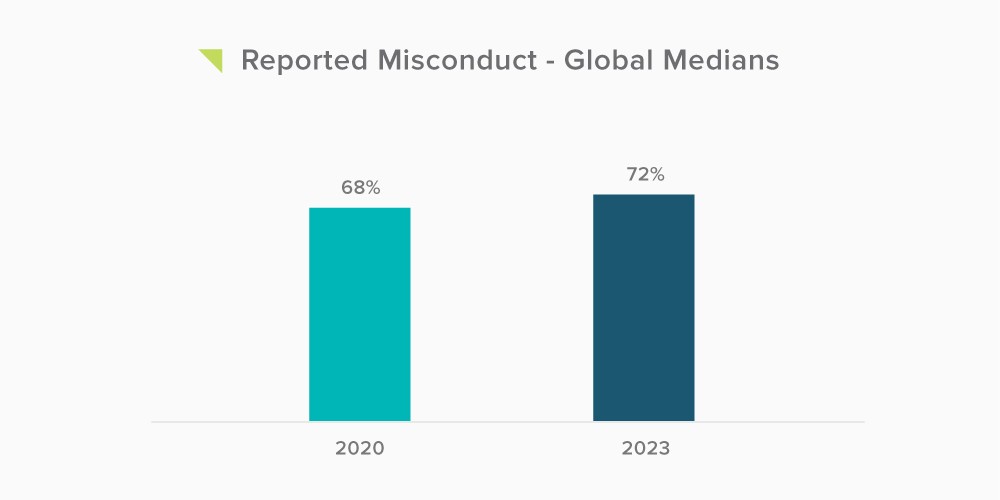
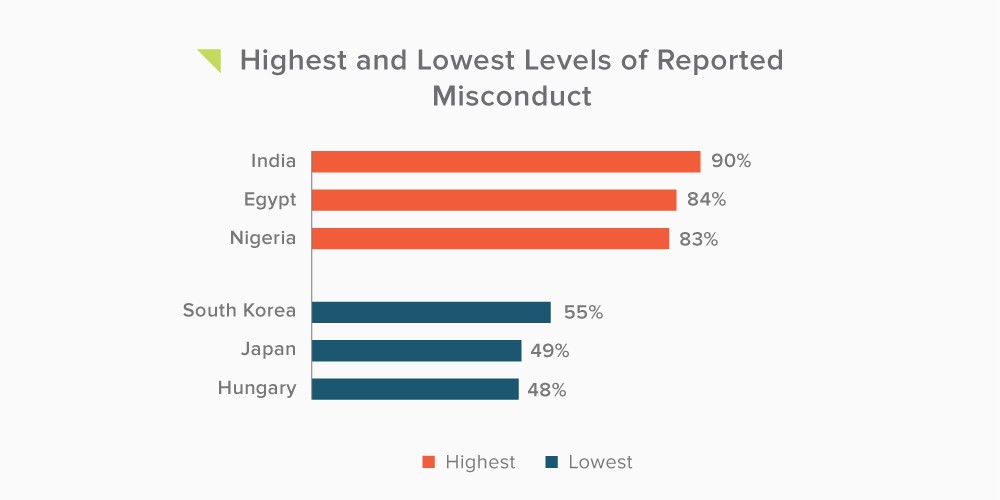
2The global median is based on the reporting of 26 possible specific types of misconduct, which are grouped together for this analysis.
Key Finding 4
Retaliation against employees who report misconduct continues to occur at unacceptable rates.
Historically, GBES results have revealed that when reporting levels rise, retaliation also goes up. In this latest update, levels of retaliation remained unchanged. Nevertheless, this is still bad news. Retaliation remains at an all-time high, with almost half of employees globally (46%) indicating that they experienced retribution for reporting observed misconduct3. In the last two GBES updates, ECI’s questions regarding retaliation after reporting were updated. Therefore, global trends prior to 2020 are not available.
Retaliation, as perceived by employees when they report wrongdoing, is one of the most intractable obstacles to achieving higher reporting levels and reducing risk for an organization. The current retaliation rate is of major concern because of its silencing effect within an organization, which tends to precede the erosion of culture.
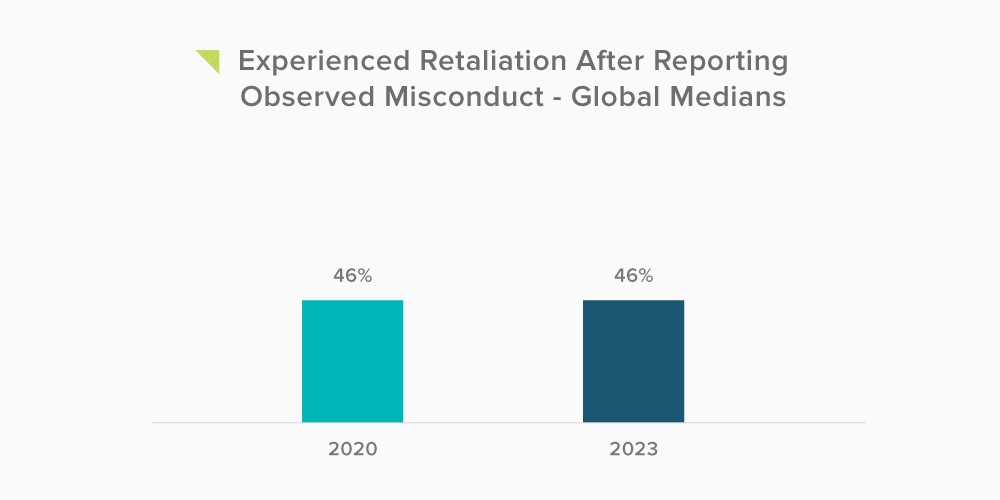
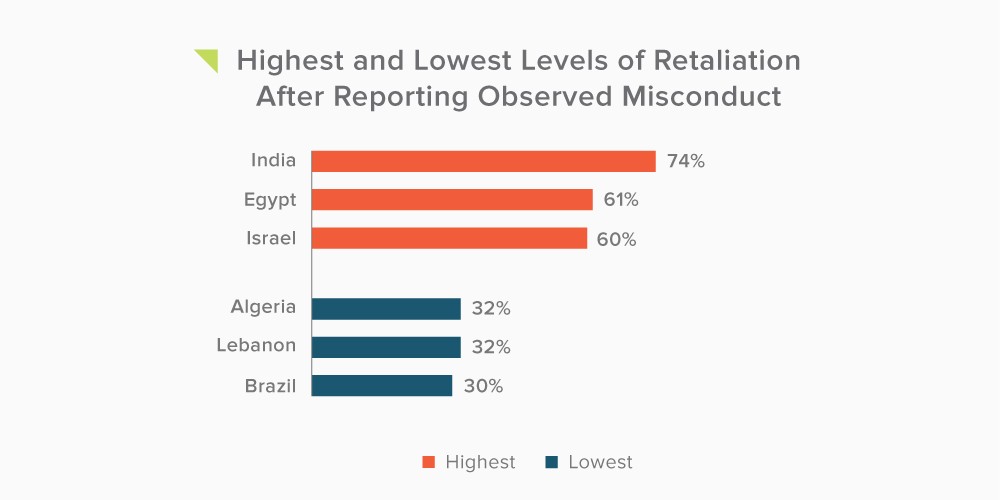
3 The global median is based on perceived retaliation from 26 possible specific types of misconduct that might have been observed and reported, which are grouped together for this analysis. Data shown in the graphic are based on a combined category of retaliation experienced after some or every report of misconduct.
Key Finding 5
Few employees say they work in a strong ethical culture.
An alarming 87% of employees indicated that their workplace does not have a strong ethical culture. 4 This means that some or all of the following are absent: ethical conduct at all levels; employee trust that leaders and supervisors will keep their commitments; provision of information to keep employees informed; and accountability when wrongdoing occurs.
Nearly 40% of employees said that they work in a “strong-leaning” culture; however, given the influence of culture on employee conduct, “strong-leaning” is insufficient. If employees at all levels do not act ethically in an organization, and accountability for wrongdoing does not exist, it is only a matter of time until there is widespread discontent, as well as heavy liabilities.
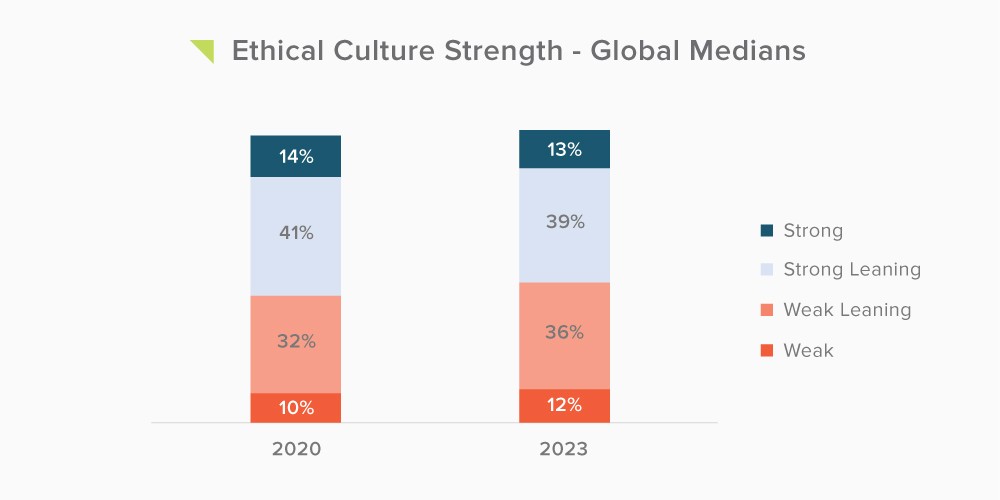
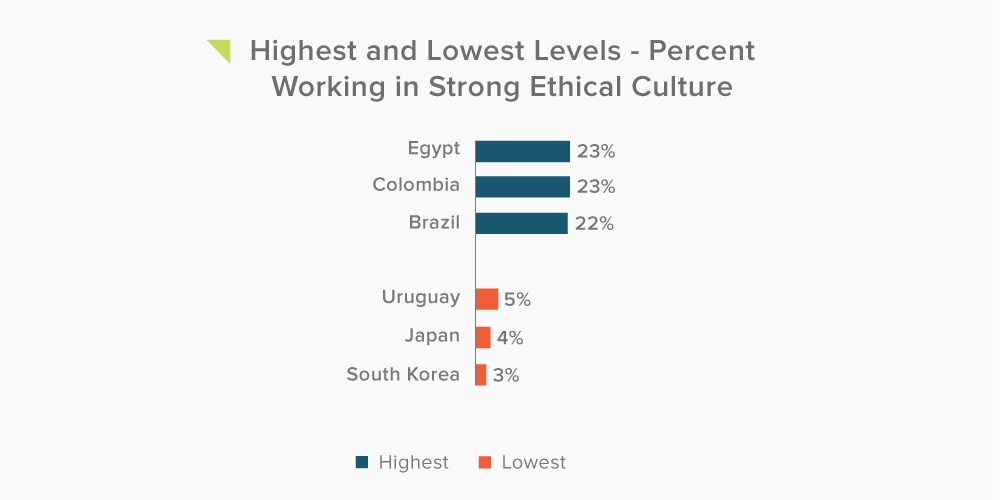
4The ECI Culture Strength Index determines ethical culture strength by combining survey items asking employees their view on the ethical behaviors and actions of top management, their supervisors and coworkers. Survey items that make up the index include the following: (1) accountability of top management and non-management employees; (2) satisfaction with information from top management about what is going on in the organization; (3) trust that top management and supervisors will keep their promises and commitments; and (4) top management, supervisors and coworkers set a good example of ethical workplace behavior. Strong ethical cultures are those where employees strongly agree that all these ethical behaviors are present. Ethical culture strength is based on the following scale: weak culture, weak leaning culture, strong leaning culture and strong culture. Data shown in the graphic are based on the strong culture category.
Key Finding 6
Businesses are not taking the steps that are proven to significantly reduce their risk.
In the 2018 GBES, ECI researched the impact of businesses that implement high-quality E&C programs in their organizations. The results (as shown below) were significant.
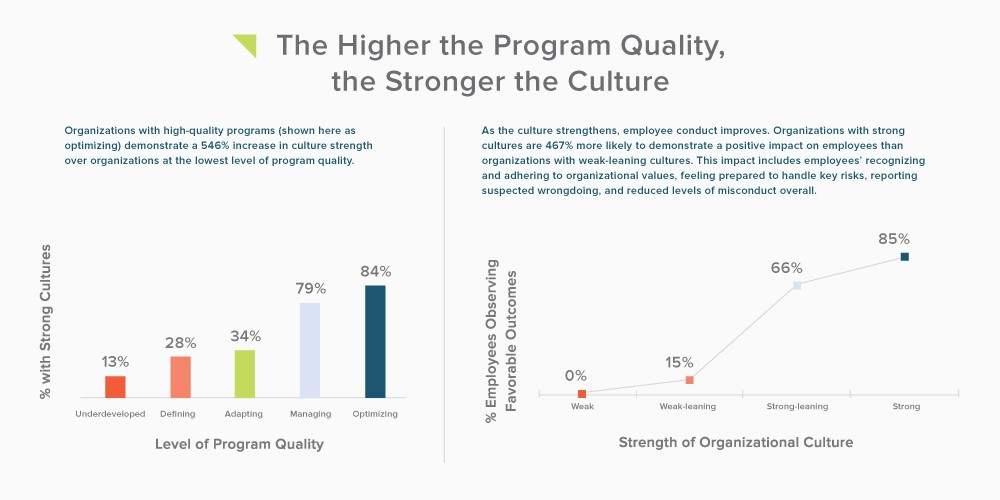
The evidence is clear that focusing on a high-quality ethics & compliance program makes a positive difference. Nevertheless, at present only 30% of employees surveyed through GBES indicated that their organization has taken steps to implement even the most basic elements of an ethics & compliance program (defined as an “underdeveloped” program in the chart above).
Conclusion
Taken together, our main findings in this GBES update lead us to believe that businesses today face higher risk of misconduct and loss of public trust than ever before.
- When employees say that they face pressure to compromise standards, they are more likely to observe misconduct. Pressure is at an all-time high.
- Employees are already working in environments where wrongdoing can occur. Misconduct is at an all-time high.
- While more employees are willing to report misconduct that they observe, the likelihood that they will experience retaliation is as high as ever. Retaliation has a silencing effect on an organization, and it occurs with alarming frequency.
- Most employees say that their workplace culture permits unethical conduct.
- Companies are not undertaking the most important effort that can reduce their risk for future problems to occur; namely implementing a high-quality program.
Presently business is one of the most trusted sectors among members of the public around the world. However, all current indications point to rampant risk for misconduct to occur. Should this take place, these organizations will not only lose the trust of their employees, but that of consumers and stakeholders. Unless major changes occur, public trust in business can, and will, be lost.
Recommendations
Below are suggestions to help reduce your organization’s risk for noncompliance and loss of trust.
- Put in place a High-Quality Ethics & Compliance Program (HQP). Since 2016, ethics & compliance professionals have worked together to define and assess the business practices that constitute an HQP. A helpful starting place is to review the free resource, Principles and Practices of High-Quality Ethics & Compliance Programs.
- Focus on managers in the effort to reduce undue pressure. Employees report feeling the most pressure to compromise workplace standards when their supervisors reward questionable work tactics, or if they only care about meeting targets. Provide supervisors guidance and training on practices that motivate employees to achieve business objectives by upholding organizational standards. Educate managers about setting clear expectations, communicating transparently, and seeking input from employees.
- Regularly remind employees of the resources that are available to receive reports of suspected misconduct. Past GBES findings have consistently shown that employees are most likely to report suspected or observed misconduct when a helpline is available. However, they prefer to report to an individual whom they know. Given that, employees need multiple options for reporting, and frequent reminders of the protections they will receive if they come forward.
- Implement a retaliation prevention program. ECI’s previous GBES research shows that the first acts of retaliation against an employee happen within three weeks of their making a report. Further retaliation generally continues to manifest over the next 12 months or longer. To address retaliation, educate managers on the actions that employees perceive to be retaliatory, in which situations those most commonly occur and ways to appropriately handle employee reports of misconduct. Monitor the ongoing success of employees who come forward to report and take action when acts of retaliation occur.
- Encourage top managers and supervisors to engage in behaviors that build a strong ethical culture. Such behaviors include talking about the importance of ethical conduct, keeping employees informed, modeling ethical conduct and disciplining wrongdoers for their actions. Establish performance metrics to hold managers accountable for their role in culture-building.
- Hold employees at all levels accountable to your organization’s values and standards. Regularly remind employees of the existence of your code of conduct, core values, and the processes in place to receive and respond to reports of suspected wrongdoing. Evaluate employee conduct and its consistency with the organization’s standards during performance reviews. Reward employees who display conduct that exemplifies the corporation’s core values. Regularly communicate summary statistics on reports of wrongdoing that have been received, results of investigations, and disciplinary actions when misconduct is substantiated.
- Assess your organization’s ethics & compliance program, culture, and impact. Benchmark your E&C program practices against peer organizations, and compare levels of pressure, misconduct, reporting and retaliation against normative data. Use assessment information to guide your organization in allocating resources to the programs and practices that reduce risk of wrongdoing and build a strong ethical culture.
Methodology
The 2022/2023 GBES data collection took place between August 2022 and January 2023. Employees in 42 countries were surveyed, and 75,495 employee responses are included in the dataset.
Survey respondents were 18 years of age or older, currently employed at least 20 hours per week for a single employer and working for an organization that employs at least two people.
Participants are representative of employees in businesses in each country conducted.
Over the years, the data collection method has been modified as various third-party vendors have been secured by ECI to collect the data. Data for this survey were collected using an online panel. Data were weighted by age, gender, race/ethnicity and geographical region. ECI established survey questions and sampling methodology. Ipsos America, Inc. managed data collection.
| Country/Region | Number of Employee Respondents |
|---|---|
| Algeria | 968 |
| Egypt | 961 |
| Israel | 977 |
| Jordan | 738 |
| Kenya | 991 |
| Lebanon | 532 |
| Morocco | 983 |
| Nigeria | 996 |
| South Africa | 994 |
| Africa & Middle East | 8140 |
| Australia | 991 |
| China | 979 |
| India | 933 |
| Indonesia | 968 |
| Japan | 880 |
| South Korea | 974 |
| Asia Pacific | 5725 |
| Argentina | 993 |
| Bolivia | 1012 |
| Brazil | 988 |
| Chile | 1010 |
| Colombia | 989 |
| Costa Rica | 1010 |
| Dominican Republic | 1010 |
| El Salvador | 1010 |
| Guatemala | 1010 |
| Honduras | 1010 |
| Nicaragua | 1010 |
| Panama | 1010 |
| Peru | 1010 |
| Uruguay | 1010 |
| Venezuela | 1012 |
| Caribbean, Central & South America | 15094 |
| France | 4851 |
| Germany | 4762 |
| Hungary | 4850 |
| Italy | 4830 |
| Poland | 4811 |
| Russia | 4829 |
| Spain | 4874 |
| Turkey | 930 |
| United Kingdom | 4902 |
| Europe | 39639 |
| Canada | 966 |
| Mexico | 993 |
| United States | 4938 |
| North America | 6897 |
| Total | 75495 |
NOTE: This report discusses data collected from employees in 42 countries from late 2022 to early 2023 (noted as 2023 data in figures and text). Comparisons are made to earlier GBES findings where possible. The global median for 2023 includes 42 countries, compared with previous GBES trend reports, which focused on 10 countries. Additionally, the previous GBES State of Ethics & Compliance in the Workplace update drew primary conclusions based on US trends and averages, while this iteration focuses solely on global trends and medians. Readers are asked to keep these shifts in mind when comparing year-over-year global median data, or in looking to previous reports stemming from GBES research.
GBES Funders
ECI’s longstanding research on workplace integrity provides insights for evidence-based decisions by corporate, academic and other institutions across the globe. Corporations, foundations and individuals invest in the work of ECI because they value the research it provides.
We are grateful for the generosity of our funders and appreciate their ongoing support. Without their investments in our research, ECI could not collect data from employees around the world and provide mission-critical reports for business leaders and the ethics & compliance community.
With your ongoing support, ECI will continue to sustain its longitudinal data collection while expanding its focus on special topics of interest to the ethics & compliance community.
Consider joining this illustrious group of funders to help ECI continue its research efforts. Your support provides the opportunity to expand our reach to serve others in meaningful ways.
Contact Information
Tel: 571-480-4417
Email: pat@ethics.org
www.ethics.org/donate
Special thanks to KPMG for supporting ECI’s implementation of the GBES survey among employees in 12 countries in Latin America.
